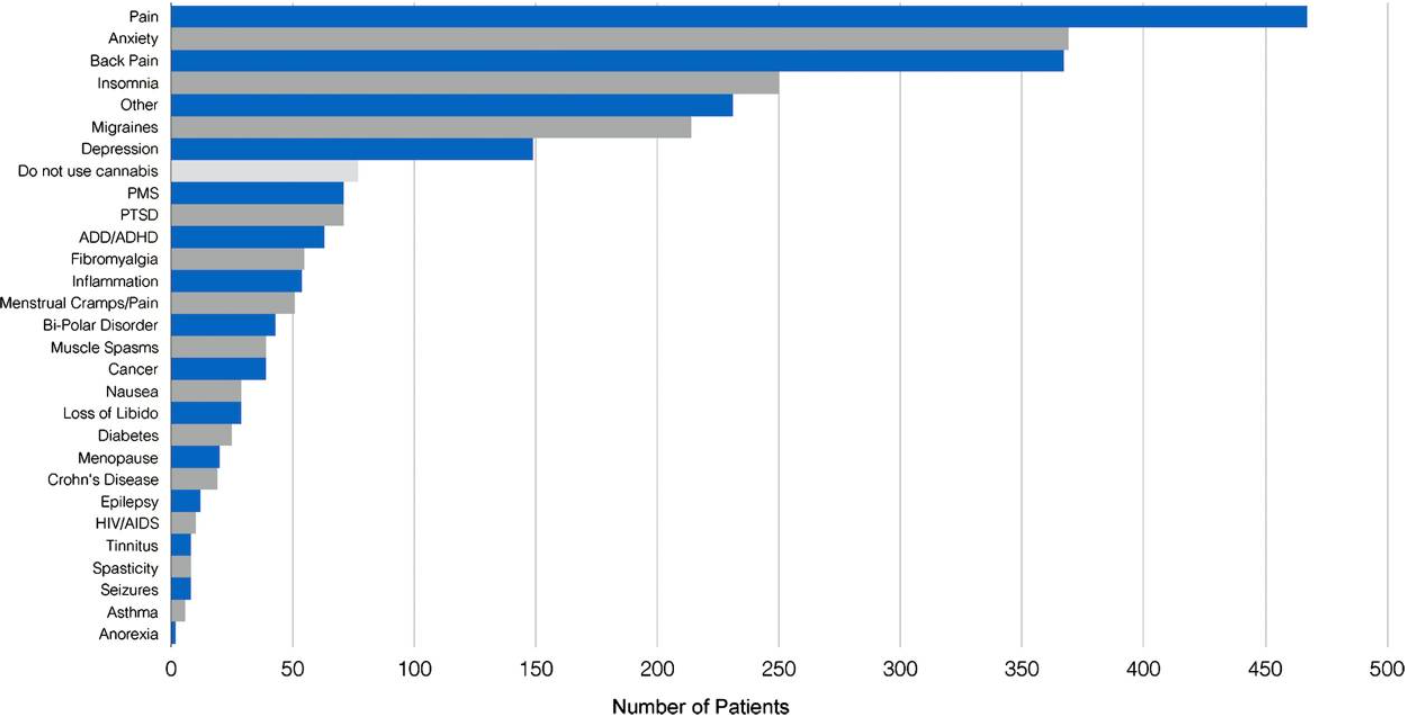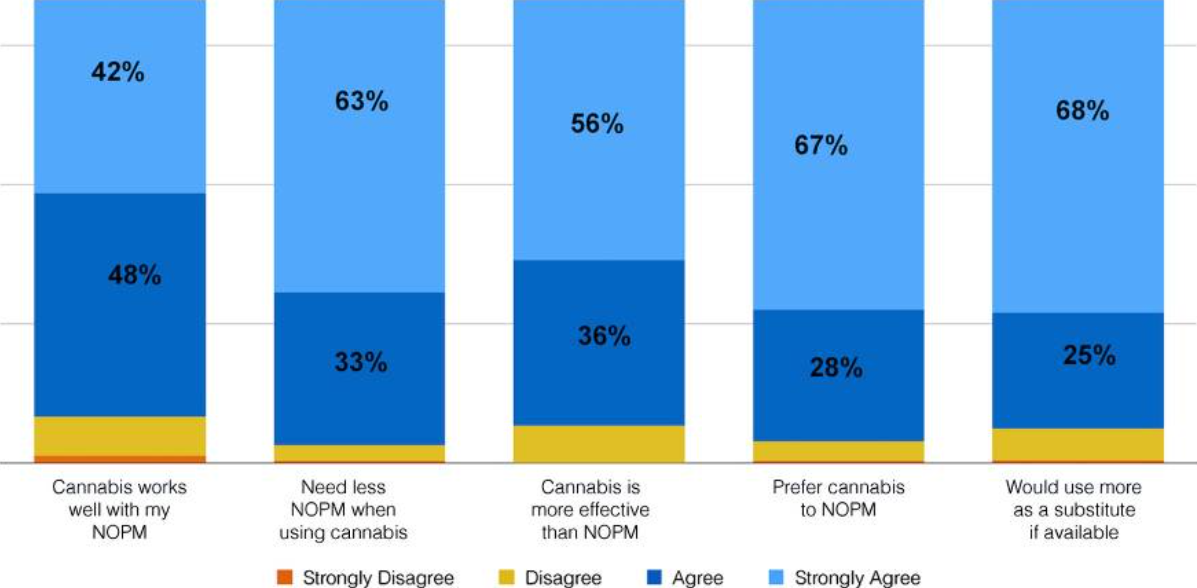Decoding Cannabis: Why thousands are replacing opioids with cannabis for pain relief
10 min read
Sam North
Opioids have long been the default for managing most chronic pain issues. Albeit powerful at targeting pain, many would argue they have been overly prescribed, and they are often alarmingly hard to come off. Yet quietly, another option has been slowly but surely making inroads in chronic pain treatment: medical cannabis.
Contents
To continue our Decoding Cannabis series, where we have a closer look at one interesting, important piece of recent research focused on cannabis-based treatment options, we’re exploring a 2017 study today titled “Cannabis as a Substitute for Opioid-Based Pain Medication: Patient Self-Report”.
In this research, the team surveyed 2,897 people using cannabis through California’s medical dispensary system about their experiences with cannabis for chronic pain relief. 34% had used opioid-based pain medication in the past 6 months, while 64% had also taken over-the-counter drugs like paracetamol or ibuprofen.
But what they described wasn’t just pain relief.
For many, medical cannabis was also helping with the secondary symptoms that so often go hand in hand with chronic pain (things like poor sleep, mental health struggles, and gastrointestinal upset).
And in many cases, it was doing enough that patients were able to reduce their other medications, or use cannabis as an alternative to opioids entirely.
Who took part in the study on cannabis for chronic pain?
The 2,897 participants that took part were using cannabis through California’s medical dispensary system. This wasn’t recreational use. These were people actively managing health issues, often in the context of long-term pain and looking for an alternative to opioids.
Just over half were aged under forty (54%), but 29% were aged 50 or older, including 15% over the age of 60. Pain-related conditions were reported across all age groups, and many participants were using cannabis specifically for chronic pain relief.
Just over half were male, and 64% identified as white. Latino (14%) and Black (7%) patients were also represented. Educational backgrounds varied: 39% had some college experience, 32% were university graduates, and 14% had completed postgraduate education.
What they had in common wasn’t age, ethnicity, or background. It was the experience of persistent pain, and a shared decision to try medical cannabis when other options hadn’t delivered enough relief.
What types of chronic pain was medical cannabis helping with?
Pain was the most common reason respondents reported using cannabis in the study. While only 16% listed it as their single primary condition, that number rose to 63% when researchers included all pain-related diagnoses.
These included conditions like back pain, arthritis, fibromyalgia, women's health pain issues, nerve pain, and muscle stiffness. Many patients were managing more than one of these at once, alongside common secondary symptoms.
This wasn’t short-term discomfort. It was the kind of recurring pain that often leads to years of trialling different medications - and (for many in this group) to cannabis as an effective pain treatment option.

Cannabis vs opioids for pain: what did patients say?
For those who had experience with both, the verdict was surprisingly consistent.
When it came to cannabis vs opioids, many patients felt that cannabis didn’t just match opioid-based medications - it often worked better, and with fewer side effects. Among the 34% of participants who had used opioid-based pain medication in the past 6 months:
- Even more striking, 81% said cannabis on its own was more effective than combining it with opioids
This wasn’t a reluctant compromise. 92% said they preferred medical cannabis to opioids for treating their condition, and 93% said they’d be more likely to choose it if it were easier to access.
When it comes to patient-reported outcomes, few studies (involving any treatment option, not just cannabis) show this level of consistency. These weren’t marginal gains - for the vast majority, cannabis was not a straight alternative to opioids, but a clear improvement.
Why did patients prefer medical cannabis over opioids?
For many, the decision wasn’t just about how well cannabis worked for their primary health concern, it was about how it boosted their overall quality of life.
Patients reported fewer side effects like constipation, nausea, and grogginess, all of which are common with opioid administration, but they are really just the tip of the iceberg when it comes to issues with opioid treatment.
In fact, 92% said cannabis had more tolerable side effects, and 81% felt that cannabis alone for pain was more effective than combining it with opioids.
This wasn’t a reluctant trade-off. It was a meaningful improvement. Many described feeling more themselves - clearer, steadier, and better able to manage their day. When pain, especially heavy pain, is a constant, small improvements can make a massive difference.
Choosing to use medical cannabis instead of opioids meant less disruption, fewer risks, and a greater sense of control.
How does medical cannabis for pain relief compare to over-the-counter painkillers?
It’s not just prescription pharmaceuticals that cannabis has the edge over. The study respondents also reported that it outperformed the everyday painkillers we all have floating about in a random kitchen drawer - the paracetamols and ibuprofens of the world.
In this cannabis vs paracetamol and cannabis vs ibuprofen comparison, the results were striking:
Again, extremely compelling data.
For many, this wasn’t about trying something trendy. Medical cannabis for chronic pain made sense - practical (but not accessible enough), and less likely to cause the digestive issues or long-term risks associated with high-dose OTC use.
Some turned to cannabis oil for pain. Others used edibles, vapes, or flower. But across the board, 93% said they’d switch completely if cannabis were easier to access - a clear signal that for this group, relief didn’t come from the pharmacy aisle. It came from a plant.

Is medical cannabis for pain relief a viable alternative to opioids?
Going by the data presented in this landmark study, it is hard not to raise not only one eyebrow, but both.
When nearly every patient who had used both reported preferring cannabis, finding it more effective, and producing far fewer side effects, it naturally invites the question of why this treatment option has only recently started to be viewed as a legitimate treatment option.
Thankfully, the tide is beginning to turn, especially here in the UK. Medical cannabis was legalised in 2018, but it is only in the past few years that access has actually become realistic for most patients.
Releaf now offers UK patients access to safe, legal, and specialist-overseen pathways into medical cannabis treatment. We do not simply hand medical cannabis out. Every patient goes through a thorough, clinician-led process to ensure treatment is appropriate, evidence-informed, and as effective as possible.
Many patients are not just adding cannabis to their treatment plans. They are using it in place of opioids. They are reporting better outcomes, fewer side effects, and a greater sense of control. For this group, cannabis is not a backup plan, it is an alternative to opioids for chronic pain that works for them.
And we've heard this firsthand. Amber, told us:
“I also like that the fact that I'm not dealing with opioids - my treatment is natural, and it's regulated, and I know it's not off the street. There's nothing that feels unhealthy about it.”
Meanwhile, Gerard, another Releaf patient, said:
“I have also found that my medical cannabis treatment has really helped me deal with the withdrawal symptoms I would experience anytime I tried to stop taking my painkillers. I’d become physically dependent even though I wasn't abusing it, just taking it as prescribed - but if I didn’t take it, I’d get sick. For people with chronic pain, I’d much rather use this than be addicted to opioids.”
And yet, the stigma remains. In the UK, outdated attitudes still prevent many people from exploring a treatment that might help. At Releaf, we are working to change that through clear information, compassionate care, and access that prioritises the patient, not the politics.
Cannabis is not a cure-all. It will not work for every single chronic pain sufferer. But when thousands of people living with chronic pain say the same thing, and keep saying it, perhaps it is time we, as a nation, stop dismissing their experience, and start paying attention.
A patient-led shift in how we treat chronic pain with UK medical cannabis
Across this study and beyond, a consistent theme is emerging - that is, medical cannabis is helping people manage chronic pain without the need to take heavy pharmaceuticals. It is not a silver bullet, nor a magic cure. But for many, it is a safer and more effective natural alternative to painkillers - and one that comes with fewer side effects and less disruption to their daily lives.
Thousands of Releaf patients are already prescribed legal medical cannabis for chronic pain, not just to take the edge off, but to avoid or reduce medications that carry significant long-term risks.
In that sense, this study doesn’t just ask whether cannabis works. It challenges us to ask why the stigma and demonisation continues - not just here in the UK, but to a certain extent globally.
If you're living with chronic pain and wondering whether medical cannabis could help, our world-class clinical team is here to support you. To start your medical cannabis journey, head straight to our medical cannabis eligibility checker - it takes just 20 seconds to complete, and once you’re done, we’ll let you know straight away if you’re eligible for treatment. From there, you can create your free Releaf account, book your consultation, upload your medical records, and get personalised support every step of the way.
Because managing pain without opioids shouldn’t be a last resort. For many of our patients, it’s the start of something much better.
Share article
Did you like this article?
It is important to seek medical advice before starting any new treatments. The patient advisors at Releaf are available to provide expert advice and support. Alternatively, click here to book a consultation with one of our specialist doctors.
Elevate your wellness with medical cannabis
Get comprehensive care, convenience, and confidence with an all-in-one treatment plan.
Am I eligible?Authors
Sam North, a seasoned writer with over five years' experience and expertise in medicinal cannabis, brings clarity to complex concepts, focusing on education and informed use.
Editorial Policy
All of our articles are written by medical cannabis experts, guided by strict sourcing guidelines, and reference peer-reviewed studies and credible academic research. Our expert clinical team and compliance specialists provide valuable insights to ensure accuracy when required. Learn more in our editorial policy.
Need more help?










